Saturday 30 September 2006 Exodus Day in Margate. Commissioned and produced by Artangel
My name is Pharoah Mann and I’m going to change the world. And I’m going to start now by doing what politicians never do. I’m going to say sorry.
Pharoah Mann, Margate 30 September 2006
Plagues of lice, locusts, frogs and flies, a 25-metre high sacrificial sculpture and a cast of thousands will dramatically transform the south coast town of Margate into a colourful and contemporary setting for an epic film inspired by the Old Testament Book of Exodus, in which the town’s residents will play all of the parts.
The Margate Exodus brings together international artists led by Penny Woolcock, including sculptor Antony Gormley, and songwriters Rufus Wainwright, Brian Eno and Imogen Heap, alongside local musicians, singers, actors, costume-makers and set-builders to create a timeless story of identity, migration and the great movement of peoples across the world in search of a promised land. Written and directed for Artangel by acclaimed filmmaker Penny Woolcock, the story of Exodus is told for the present day as a feature film for theatrical release and Channel 4 broadcast in 2007.
Exodus Day on Saturday 30 September takes place in Margate’s town centre, at the Winter Gardens, along the Seawall, through the streets and in the Dreamland funfair. The day opens with Pharaoh’s impassioned election victory speech and ends with an epilogue of fire and water on the coastal path. High above Dreamland towers Antony Gormley’s ominous Waste Man, a giant combustible thrift store sculpture, standing 25 metres tall. Filled with the collective detritus of consumer society and hand built by the local community using abseilers and pulley systems, Waste Mansignals a decisive turning point in the Exodus story and an enduring beacon for Exodus Day.
During the day, a cycle of Plague Songs written by international singer-songwriters and inspired by the ten biblical plagues in the Book of Exodus, are performed by local musicians and singers at the Winter Gardens. A diverse range of musical forces from hurdy-gurdy to hip-hop have been uncovered through auditions held by voice coach Mary King of Channel 4’s Operatunity and musical director and multi-instrumentalist David Coulter. Rufus Wainwright has taken a personal approach to the Death of the First-Born whilst Scott Walker brings about Darkness. Cody ChesnuTT communicates a higher authority with Boils and Martyn Jaques of The Tiger Lillies evokes Hailstones. Brian Eno and Robert Wyatt take wing together for Flies, Laurie Anderson mourns the slaughter of cattle for Death of Livestock and Imogen Heap conjures up a swarm of locusts in the ecstatic Glittering Cloud. A CD of the songs performed by the original singer-songwriters will be available for Exodus Day and on general release in October on 4AD.
The large-scale photographic project Towards a Promised Land, by Wendy Ewald also plays a part in the day’s events. These banner photographs of children who have relocated to Margate from places near and far are sited in various locations around the town. The audience follow an audio trail of the photographs by collecting a headset from a central pick-up point in town or downloading the audio trail as a podcast from the Margate Exodus website. A book of texts and images co-published by Artangel and Steidl, will also be available.
It is anticipated that a great many people from Thanet will take an active part in this ambitious project and that Exodus Day will attract a substantial audience from Kent, London and beyond.
Klashnekoff : Blood [Plague of Blood]
King Creosote : Relate The Tale [Plague of Frogs]
Stephin Merritt (The Magnetic Fields) : The Meaning of Lice [Plague of Lice]
Brian Eno & Robert Wyatt : Flies [Plague of Flies]
Laurie Anderson : The Fifth Plague [Death of Livestock]
Cody ChesnuTT : Boils [Plague of Boils]
The Tiger Lillies : Hailstones [Plague of Hail]
Imogen Heap : Glittering Cloud [Plague of Locusts]
Scott Walker : Darkness [Plague of Darkness]
Rufus Wainwright : Katonah [Death of The Firstborn]
Previously on { feuilleton }
• Generative culture
• Wyatting
• The Drift by Scott Walker
• My Life in the Bush of Ghosts

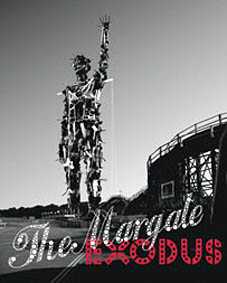
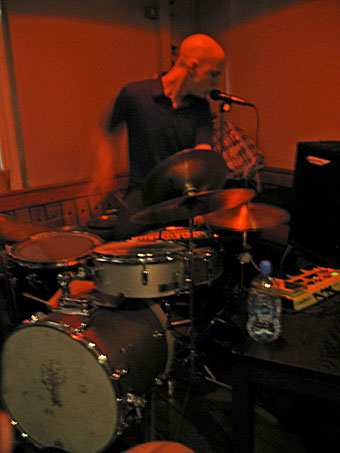
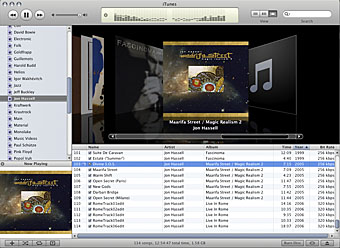
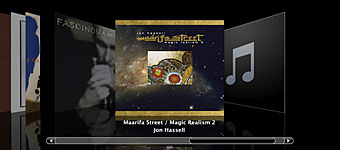
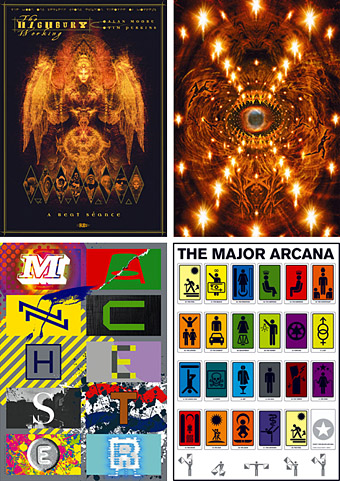
 ‘He created his own universe and became its star’
‘He created his own universe and became its star’